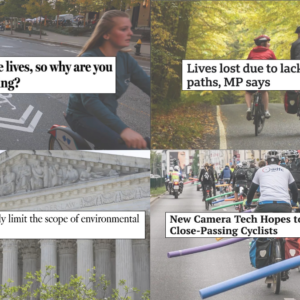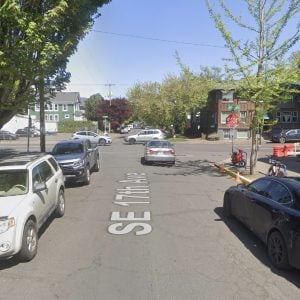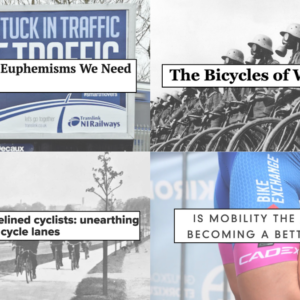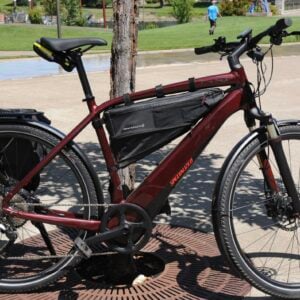Here’s an interesting post published in the Portland Bike Forums last night by “Cecil M”.
It details how, after being charged for a total of $750 in violations while riding through Ladds Addition, “an accepting attitude and jumping through judicial hoops” ended up saving him/her a ton of cash:
“I just got back from a short experience in traffic court for the stop sign I didn’t stop at in Ladds Addition. Beyond being cited for “failure to stop at a traffic control device” I also received citations for “failure to recognize a one way street sign” and “going the wrong way on a one way”.
All told the charges added up to $750.00.
The officer who pulled me over gave me the chance to take the “I Share the Road” class. I took the class which cost me 30 dollars and went to court today where the officer offered to drop the stop sign charge $246.00, to failure to use a proper turn signal $93.00. and drop the other two charges. Because of my clean record the judge dropped the charge to $73.00.
Having an acccepting attitude to my traffic violation and jumping through the judicial hoops in a punctual manor saved me $650.00.”
The class Cecil refers to is the Share the Road Safety Class that has been covered at length on this site.
Read responses to this thread and browse other topics over in the Forums.







Thanks for reading.
BikePortland has served this community with independent community journalism since 2005. We rely on subscriptions from readers like you to survive. Your financial support is vital in keeping this valuable resource alive and well.
Please subscribe today to strengthen and expand our work.
Hooray for education (even when combined with enforcement; or maybe, especially when combined with enforcement).
I too had the opportunity to \”learn and save.\” Yes, even though I am a car-free, life-long bicycle commuter and am, in fact, paid to teach folks safe biking practices, I am also human. As a result of this imperfect state I found myself rolling through a stop sign after a somewhat perfunctory look around. Somehow I missed the presense of a motorcycle cop to my right.
I was surely annoyed at being pulled over, but at the same time I had no qualms about it – even if he didn\’t have a badge he certainly had the right-of-way (having stopped before me, and being to my right as well). Now, I\’m not always 100% in agreement with traffic law, since it applies rather heavy-handedly to light and nimble bicycles. But I am a staunch proponent of respecting each others\’ right-of-way.*
The class was rather painless, and even for someone who spends good parts of the day thinking about this stuff, informative. My favorite bit was the motorcycle officer who presented a safety talk, preceded by the observation that in Germany there are no cup holders in motor vehicles. They consider driving serious business, requiring one\’s full attention. Contrast that with our American assumption that one\’s car is a satellite of one\’s living room, complete with cushy seats, climate control, expensive sound system, and often phone, teevee, and video games. It\’s a wonder that anyone is awake enough to drive.
Congratulations Cecil, I\’ll see you out there on the roads, yielding to peds and observing traffic control devices.
*My favorite right-of-way lesson came when both I and another cyclist (to my left) rolled stop signs at an otherwise deserted intersection simultaneously. When by chance I caught up with him at a light he apologized sheepishly. I told him it gave me a good laugh – when two bikers roll stop signs at the same intersection, which one has the right-of-way?
What does it say for the fairness, efficiency and purpose of policing whereupon taking time off work and asking nice gets the punishment so reduced? Not a lot.
Whaddaya know, two bike-riding Cecils in town. Well, that will certainly start providing me with some cover . . .
I think it says quite a bit. Whether or not what it says is a \”good\” thing is totally subjective, of course.
Cops and judges are human. Deal with them in an honest, forthright and civil manner, and as with all humans, you are more likely to receive honest and civil (and sometimes preferential – the system is not perfect) treatment in return.
If you reduce the system to merely the letter of the law, we\’d still be complaining the system was unfair – only the method and scope of its \”unfairness\” would change.
Frankly, IMO the purpose of policing is not to be fair – the purpose of policing is to apprehend those who are damaging society and discourage lawless behavior. This is a very results-oriented view, which is why I believe the police should be concentrating their efforts on the areas that provide the most results (i.e. stake out 82nd Ave instead of Ladd\’s).
Second part is true, first part is not.
Options Man,
Isn\’t your bike the Trek mountain bike with suspension fork, cushy seat, and coffee-cup holder? Hmm…
Lied to by a peace officer?!? Shocking!
Post #1: I told him it gave me a good laugh – when two bikers roll stop signs at the same intersection, which one has the right-of-way?
Hmmmm. Sounds like there should be a set of rules governing right of way.
The thing I love about encountering another cyclist at an intersection, with both of us rolling it, is that in just a moment, with just eye contact and a smile, it is almost always worked out easily. There is so much non-verbal communication that can happen when you\’re not encased in steel and glass.
I\’d use verbal communication, supplemented with non-verbal exclamation.
uh, just kidding. 😉
Sort of.
I don\’t think anybody should be deluding themselves that smiling at me makes it OK to violate my right of way, collide with me, or whatever. Ya know?
\’cause it\’s not OK. Really.
Funny right-of-way story: my partner was biking on the Eastbank Esplanade between OMSI and the Hawthorne Bridge as another cyclist was coming the other way. My partner was riding just inside the faded white line going northbound, whereas the southbound cyclist was also just inside the white line, presumably because he didn\’t notice the very faded white line, and considered himself on the west side of the entire paved section. Both thought themselves to be in the correct position on the path, and then both collided head-on, and fell.
It\’s important to have established right-of-way rules, but nothing beats avoiding a collision.
And I agree with rixtir. Smiling and saying hi is nice and all, but it doesn\’t excuse blowing through a stop sign when you should have waited your turn.
I am strongly in favor of mandatory road use licenses for anyone who bikes on non-neighborhood roads (or maybe roads over 25 mph, or some sort of fair exception for young-uns). I think all users of roads should know how to share them. I\’m also in favor of a more difficult driver\’s licence test, including more education on how to share the road with bicycles, motorcycles, and pedestrians.
It is pitiful to see so many people submiting and accepting a ridiculous punishment without expressing resent or the slighest outrage. There\’s something really wrong with all this submissiveness. If the cyclist had caused an accident or hurt someone, would make sense to accept a punishment. But following every traffic law when riding a bike is pathetic. In most situations they serve no purpose. Breaking these laws is a way the avoid turning into a robot, programmed to only move according to rules and orders, and navigating the landscape strictly on the tracks. It is exciting to subvert the little burocracies of everyday life, and make your own way to places.
\”I respect orders but I respect myself too and I do not obey to foolish rules made especially to humiliate me.\” Jean-Paul Sartre
Spiney, the purpose of the law isn\’t negated just becuase you claim– falsely– that it doesn\’t have a purpose. Maybe you should conmcentrate less on growing a spine, and more on growing some gray matter? Or at least on coming up with a reasonable facsimile of an argument…
rixtir,
An reversed argument makes more sense: the purpose of the law should be proved by those who claim it to be necessary, and not the other way around. It is a bad habit to consider the need for existent laws and customs as self evident.
There\’s no need to come to a full stop at an intersection when you are in a bike, since a good biker can perfectly see if the way is clear or not by simply slowing down – and a good bike alows the cyclist to stop almost instantaneously if he needs to.
And beyond that, what is the purpose to give tickets to a cyclist for not stoping at a stop sign?? Where does this culture of punishment come from?? What, really, do we expect to achieve with this kind of practice??
From my understanding of the history of law, the concept of punishment belongs to a general strategy to keep the populace under control, docile, and aware that it is under constant surveillance. In a disciplinary society like ours (in the carceral continuum, as Foucalt calls it) – we are taught to believe that any circunstance that is not thouroughly regulated would cause overwhelming conflicts and, perhaps, violence. And the docile citizen is completely unable to improvise and deal on his own when situations of \”conflict\” arise. Is it really that hard to decide what to do when 2 bikers come from different directions at an intersection?? I think that the intervention of law enforcement in simple issues like this does only create more problems and make matters more complicated. And to force a grown up to sit in a classroom because of irrelevant traffic rules – that\’s like treating people like little kids, and not like responsible citizens. That\’s just humiliating.
An reversed argument makes more sense: the purpose of the law should be proved by those who claim it to be necessary, and not the other way around. It is a bad habit to consider the need for existent laws and customs as self evident.
Who said it was self-evident? I said that you presented no argument to support your claim that the law has no purpose. And you ducked it again with this response, which indicates you have no argument.